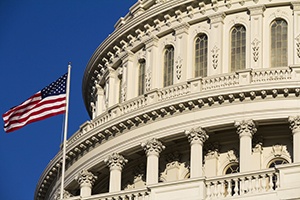 Summer is usually a quiet time on the economic front. This year, we’ve had more news than expected—Russia and Ukraine, Iraq and ISIS, Israel and Gaza—but the general mood has been one of torpor, at least here in the U.S. Economic news has been mixed but generally positive, politics has stayed off the front pages, and the headlines have focused more on the summer than the fall.
Summer is usually a quiet time on the economic front. This year, we’ve had more news than expected—Russia and Ukraine, Iraq and ISIS, Israel and Gaza—but the general mood has been one of torpor, at least here in the U.S. Economic news has been mixed but generally positive, politics has stayed off the front pages, and the headlines have focused more on the summer than the fall.
As we enter August, though, it’s time to start thinking about issues that will come back into focus when everyone returns from the beach.
Politics heats up again
As the election cycle ramps up, we'll undoubtedly see a heightened level of rhetoric and confrontation. With the Republicans looking increasingly likely to take control of the Senate, the prospect of a truly divided government will introduce more uncertainty into economic policymaking, especially as the Federal Reserve approaches a critical moment. Expect to see lots of ads, mostly negative, and maybe even a lawsuit against the president for malpractice.
Economically, this is smoke, not fire. In the immediate future, the government won't have the opportunity to do any systemically significant economic damage. The areas where the government may, in fact, do some harm include:
- The policy arena—for example, the current fight over the renewal of the Export-Import Bank program
- Trade—for example, the U.S. government’s imposition of tariffs on Chinese solar products
- And, perhaps most visibly, increased federal interference in monetary policy
What happens if Congress takes over monetary policy?
This brings us back to the Fed, which plans to stop its asset purchase program in October, just before the elections. Should the Republicans take over the Senate, they'll be in position to carry out their plan to reshape the way monetary policy is handled, by removing much of the Federal Reserve Board’s discretion and replacing it with a rule-based system.
I have mixed feelings about this idea. It will certainly solve some very real problems while creating new ones—and it’s unclear whether the new problems will be better than the old. On the other hand, after 20 years of repeated bubbles, you can make a reasonable case that a new system could hardly be much worse.
The real concern is bringing politics into an area where it has largely been absent. If Congress sets the rules, then Congress can change them—and then we have Congress running monetary policy as well as fiscal policy.
In theory, the idea has merit. In practice, were Congress to mess up monetary policy as thoroughly as it has fiscal policy, we would now be seeing the hyperinflation so many have warned against. The best that can be said for this kind of change is that it would introduce massive uncertainty into the markets, especially for interest rates.
Will interest rates shock the markets?
Rates are at very low levels, and many people expect them to remain there. And that’s the problem: when everyone is expecting one thing, the damage if something else happens is magnified.
With the uncertainty around the Fed’s exit from stimulus, the possible congressional changes in Fed operations, and the improvement in the economy (which should lead to higher interest rates anyway), the potential for a surprise rate increase is something the markets aren't fully considering.
Everything in the financial world is priced off interest rates, so an unexpected increase would amount to an earthquake, rocking the foundations of markets. Is that likely? Possibly not, but as we've learned over the past decade, even unlikely events—a national housing decline, for example—are worth considering if the damage would be great enough.
That said, let’s enjoy the rest of the summer
Speaking of torpor, I'll be putting the blog on summer reruns for a few days starting Wednesday, as I’m taking my son to see his grandparents and cousins. While I'm away, you'll find several past posts that deserve another look, so be sure to stop by!


 Print
Print

